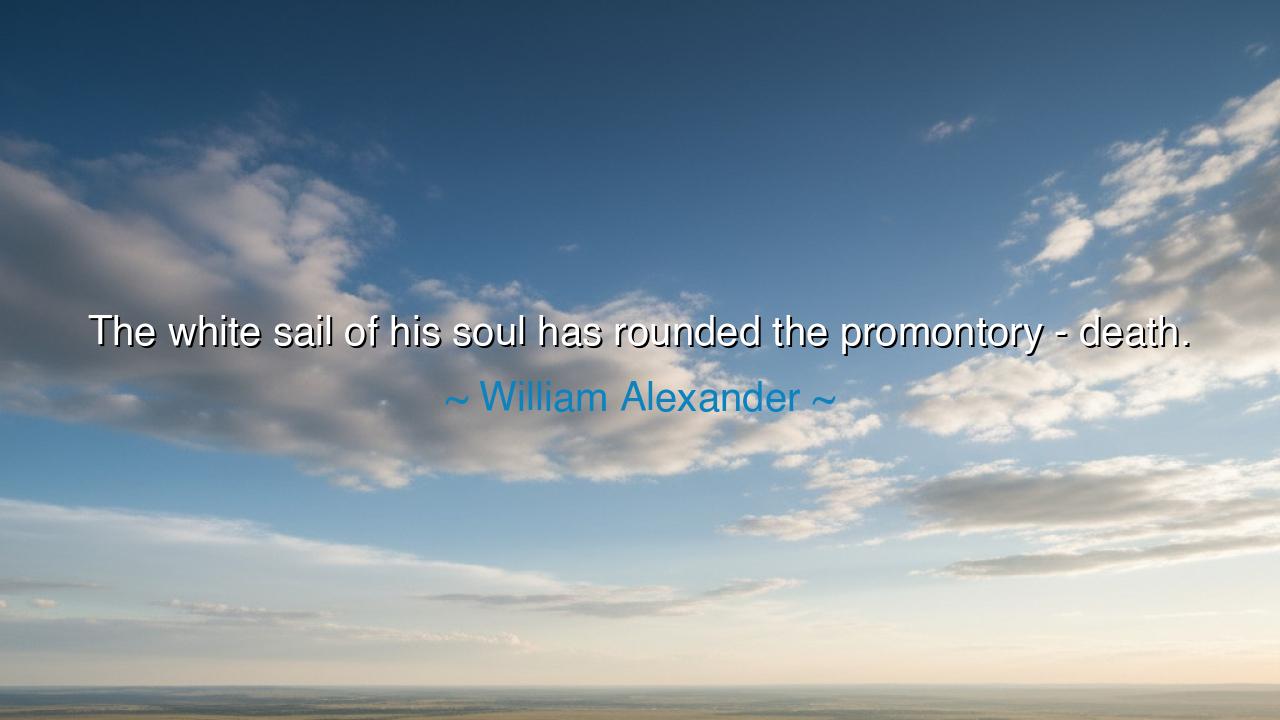
The white sail of his soul has rounded the promontory - death.






The words of William Alexander — “The white sail of his soul has rounded the promontory — death” — are among the most graceful ever spoken about the mystery of dying. They are not the cry of grief, but the sigh of understanding — a vision that sees death not as an ending, but as a voyage completed. In these words, the soul is not a flickering light extinguished, but a white sail, gleaming and pure, catching the divine wind as it passes beyond the sight of mortal eyes. The promontory — that final curve of the shore — represents the last boundary of earthly life, the edge between the known and the infinite. And when the soul rounds that edge, it does not fall into darkness, but sails onward into the great expanse of eternity.
To speak of death in such beauty is to understand its secret nature. The poet saw what so many fear to see — that death is but a continuation of the journey, not a wreck upon the rocks. The white sail speaks of innocence restored, of the soul unburdened by flesh and fear, moving now in the quiet majesty of freedom. We who remain upon the shore see the ship growing smaller, fading into mist, and we cry out that it is gone. Yet it is not gone — it has only passed from our sight. Somewhere beyond the horizon, it sails in calm seas, welcomed by unseen hands.
This image, ancient and eternal, echoes the wisdom of the old philosophers and the mystics of many lands. To the Greeks, the soul was a traveler ferried by Charon across the river of death; to the Hindus, it was a spirit set free from the wheel of rebirth, returning to the divine. To the Christian poet Alexander, the image of the sail held the promise of resurrection — the soul’s triumphant passage into peace. Each tradition, in its own tongue, has said the same: that death is not destruction, but transformation, not an abyss, but a crossing.
Consider the example of Florence Nightingale, who gave her strength and life to heal the broken in war. When she lay upon her deathbed, she asked for no monuments or songs — only that her work continue, that others learn to serve with compassion. When she passed, those who loved her did not say she was gone; they said her spirit had sailed on, beyond the fever and the blood, into the light. Her white sail had rounded the promontory, and her legacy became the wind that still fills the sails of those who serve humanity today.
There is deep comfort in this vision for all who have lost someone dear. When we stand upon the shore and watch that sail vanish, we feel sorrow — and rightly so, for love binds us to the visible world. But we must remember: the sea does not end where the eye can no longer see. The voyage continues. Our tears are but the salt of the sea itself — the same waters that carry the soul onward. To believe this is not to deny grief, but to give it shape and peace. Death, seen through this light, is no thief; it is a guide, carrying the beloved home.
And what lesson shall we draw from this, O children of the living earth? It is this: live so that when your white sail rounds the promontory, it shines with purity and courage. Live without fear of that crossing. Do not weigh your soul with bitterness, for it will slow your passage. Let your life be filled with compassion, forgiveness, and truth, for these are the winds that will bear you safely to the farther shore. Remember always that each day you live is another knot in your great voyage — and each act of kindness a star by which others may navigate when your sail is gone from view.
So when the time comes, do not dread the horizon. Look toward it with calm and gratitude. For beyond it lies not an ending, but a homecoming. The white sail of your soul, bright with the memory of all that was noble and good, will round the promontory — and in that moment, you will pass not into nothingness, but into the vast and eternal sea of the divine. Thus, the poet’s vision becomes a promise: that every soul, having weathered the storms of life, shall one day sail free, radiant as dawn, into the boundless light beyond.






AAdministratorAdministrator
Welcome, honored guests. Please leave a comment, we will respond soon